Please Take Note: This is a review of the final game, but it might change slightly based on the success of the Kickstarter campaign. The game is being reviewed on the components and the rules provided with the understanding that “what you see is not what you might get” when the game is published. If you like what you read and want to learn more, we encourage you to visit the game publisher’s website or visit the Kickstarter campaign. Now that we have all that disclaimer junk out of the way, on with the review.
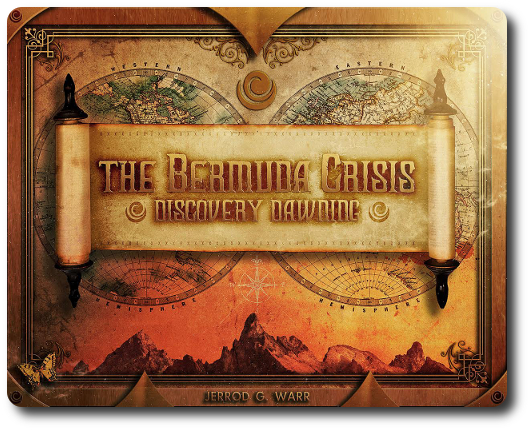
The Basics:
- For ages 8 and up (publisher suggests 12+)
- For 2 to 4 players
- Approximately 60 minutes to complete
Geek Skills:
- Active Listening & Communication
- Counting & Math
- Logical & Critical Decision Making
- Reading
- Strategy & Tactics
- Hand/Resource Management
- Trading
Learning Curve:
- Child – Easy
- Adult – Easy
Theme & Narrative:
- A mysterious island in the middle of the Bermuda Triangle hides a secret
Endorsements:
- Gamer Geek approved!
- Parent Geek approved!
- Child Geek mixed!
Overview
You and your team are heading to an island in the middle of the Bermuda Triangle that is not listed on any map. It’s an island that should not exist, but does. You cracked the ancient code and know where to look, but you are not alone. Other groups have found the island, as well. It’s now a race to discovery the secrets of the island and own its mysteries.
The Bermuda Crisis: Discovery Dawning (2nd Edition), designed by Jerrod Warr and to be published by Lysander Games, will reportedly be comprised of 1 Discovery Dawning track, 23 Catalyst cards, 24 Ambush cards, 21 Boost cards, 20 Venture cards, 69 Common cards, 42 Rare cards, 3 Brinehorn’s Scroll cards, 45 plastic chips, and 4 Skill Maps (double-sided). As this is a review of a prepublished game, I cannot comment on the component quality. The artwork provided, while not finalized, does an excellent job of capturing the game’s theme of survival and exploration.
Welcome to Paradise
To set up the game, first give each player a Skill Map. The Skill Maps have 2 sides. On one side are the “Basic” skills and on the other are the “Advanced” skills. For first time players, I suggest the “Basic” side. It’s not necessary for all players to use the same side. Place the Skill Maps in front of the players and any not used back in the game box.
Second, place the Discovery Dawning track in the middle of the playing area and place 1 plastic chip on the “Start” space”. Then place 1 plastic chip per player on the “Stability Stones” space. Place the remaining plastic chips to one side to create a chip pool.
Third, separate the cards by type and shuffle each. Place each deck of cards face-down to create the Common, Rare, Ambush, Boost, Venture, and Catalyst draw decks. Leave room for discard piles. If at anytime a deck is depleted, shuffle the discard pile to create a new draw deck.
Fourth, deal 3 Common and 1 Rare card to each player. These represent the player’s starting resources. If any player is dealt an “Artifact” or a piece of “Brinehorn’s Scroll”, give them a new card and place the taken card back in the deck. Shuffle as needed.
That’s it for game set up. Determine who will be the first player and begin.
Riddles, Secrets, and Jungle
The Bermuda Crisis is played in rounds and turns. When the game begins, the players have very few rules to follow and actions to take. As the game progresses, the number of choices they can make and how to go about resolving them changes. In many ways, the game evolves as the players improve their skills and acquire various pieces of equipment and artifacts. Given this, I will explain the basic game play only, as it’s impossible to document a single version of game play when the game itself is never the same game twice.
Step 1: Take Actions
On a player’s turn, they have the following basic actions they can take and in any order, but the steps will always remain the same.
Build or Upgrade
Players build camps during the game using resources. The first camp to be built is the most basic and requires few resources to get up and running. Building and upgrading the camp gives the player access to additional abilities.
As the game continues, the player can invest in their camp and upgrade it to an advanced and then to an ultimate state of readiness. Each upgrade provides an additional ability that can then be used.
Building camps and upgrading them also gives the player victory points. The “Basic” Skill Map only gives 1 ability, but the “Advanced” Skill Map forces the player to make a choice from multiple abilities.
Buy Mystique
The Mystique cards give the player a different approach to victory. There are 3 different types of Mystique cards. These are Ambush, Boost, and Venture. Mystique cards also provide nature points, which is one possible way to win the game.
Ambush Mystique cards cost the player any 3 Common resources to purchase. Theses cards focus on aggressive and offensive play by allowing the player to specifically target an opponent or an opponent’s controlled resource. For example, disabling an opponent’s camp, which stops the opponent from using the camp ability.
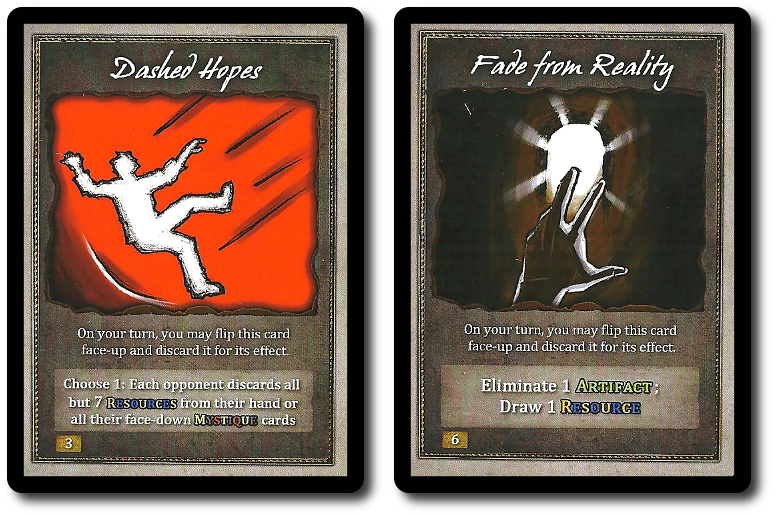
Boost Mystique cards cost the player any 3 Rare resources to purchase. These cards are the polar opposite of the Ambush Mystique cards, focusing and specializing on defensive actions and collecting resources, rather than destroying them.
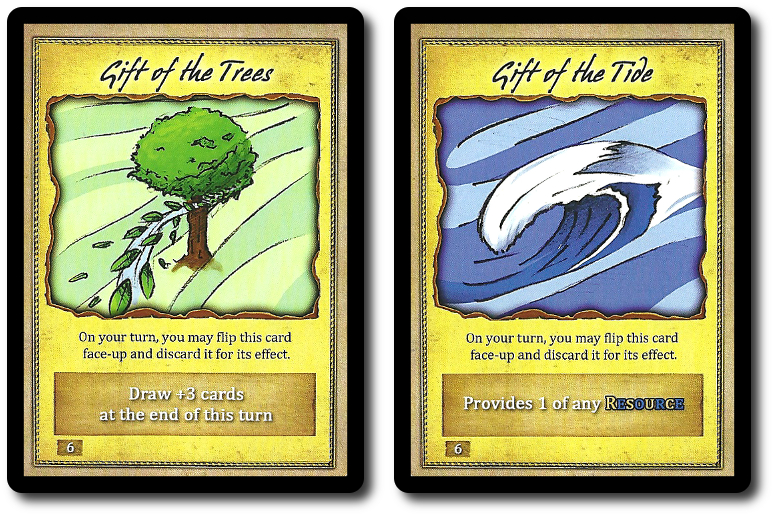
Venture Mystique cards cost any 3 resources to purchase. These cards remain in play for the duration of the game and are placed face-up in front of the player with the blue (positive) side placed upwards. Venture Mystique cards will give the player a bonus and possible ability until an opponent targets it with an “Artifact” and causes the Venture Mystique card to rotated to the red (negative) side. At which point, the Venture Mystique card becomes a bane instead of a boon. Sometimes, however, negative events also reward the player with points.
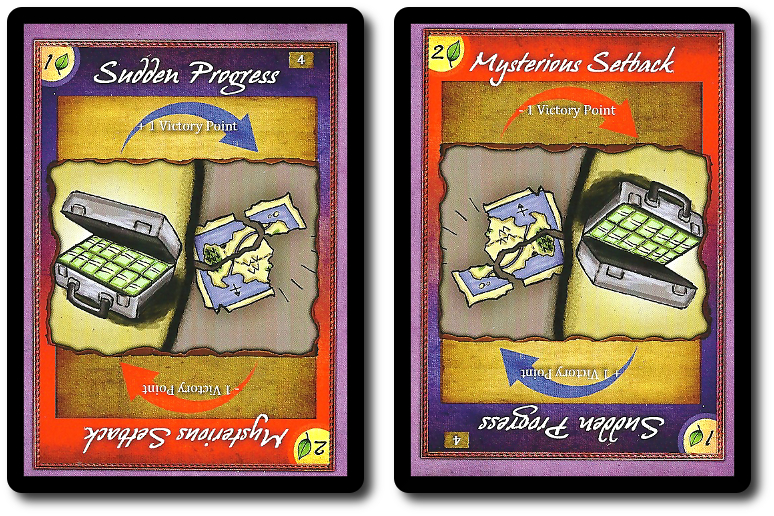
Activate Abilities
As the game progresses, players will invest in their Skill Map and collect Venture Mystique cards. These give the player additional actions and abilities. Any of these that are available can be taken by the player on their turn.
Ambush or Boost
After acquiring Ambush and Boost Mystique cards, the player can use them on their same turn or on a later turn. To use, simply announce and play. Once resolved, they are discarded.
Use Artifacts
Artifacts are powerful relics found on the island. Who they were created by and for what purpose is unknown. One thing is for certain: they are not to be taken lightly.
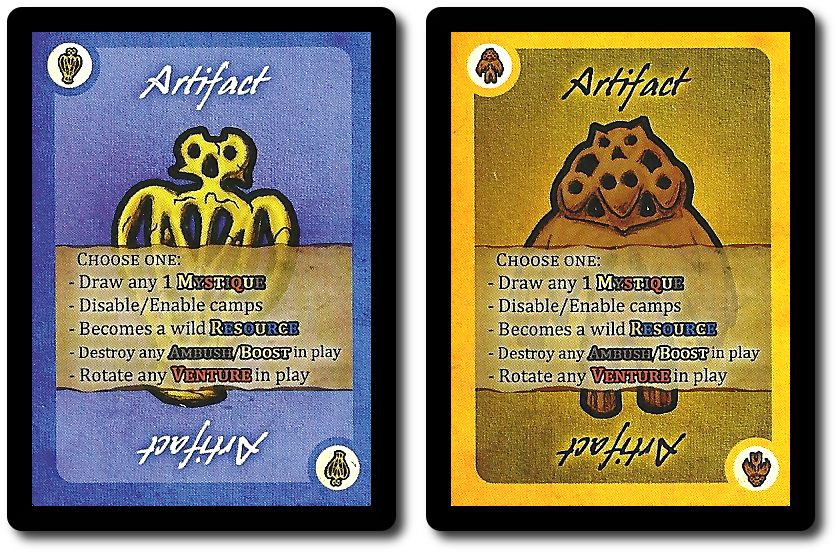
Artifact cards can give a player a number of abilities including drawing Mystique cards, disabling or enabling camps, morph to represent any needed resource, destroy other cards, and change the fate of others by rotating Venture cards.
Artifact cards also advance the plastic chip on the Discovery Dawning track. As the plastic chip advances, it will sometimes give each player an action. Artifacts also force the game to move ever closer to ending.
Trade
Trading is essential in the game and a slippery slope that must be navigated with care. Trades can only be initiated on the player’s turn and all trade deals are done in the open at the gaming table. Any and all trades are possible, including goods and services that can be provided now and those that can be found later. Players can agree to whatever they like and every trade must be honored (you cannot lie in the game). However, caution should be taken. Trading is a great way to get what you need and quickly, but a player might be giving something of equal or greater value to their opponent.
The only restrictions to trading are as follows:
- Nothing attached or in use by a player’s camp can be traded
- Venture cards cannot be traded
- Catalyst cards cannot be traded
- Brinehorn’s Scroll cards can be traded as long as they are not part of a complete set
Step 2: End Turn
When the player is done taking all the actions they want to, they end their turn by drawing 4 resources from the Common and Rare draw decks. The number drawn from either draw deck is up to the player, but the total number of cards drawn cannot exceed 4.
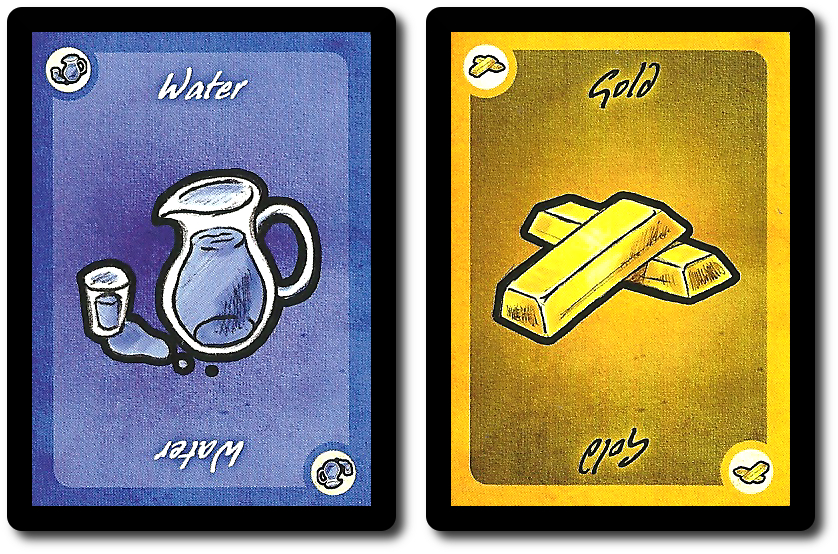
Common resources are needed for just about everything, but the Rare resources are necessary to build the best of the best
If a piece of Brinehorn’s Scroll is drawn, it must be placed face-up in front of the player immediately.
If an “Artifact” is drawn, it must also be placed face-up in front of the player immediately. Then the plastic chip is advanced on the Discovery Dawning track.
Skills and Tracks
The Skills Map (which is essentially a tech tree) can be a bit difficult to navigate at first. When placed in front of the player, the bottom most row represents the starting level. The resources needed to acquire a plastic chip (which equals victory points) is listed. The ability and actions to be unlocked are also listed. Both the “Basic” and the “Advanced” side are almost identical in their use, but the “Advanced” side gives the player more options and ways to customize their strategy. The building and advancement methods are the same, but the outcomes are different. Building camps creates for a more efficient game, Mystique focus on giving the player a better opportunity to act and react to other opponents by communing with the island, and Asylum focuses on diplomacy, trading, and manipulation. While a player is welcome to advance all skills on the map, the three different types tend to be associated with very different strategies.
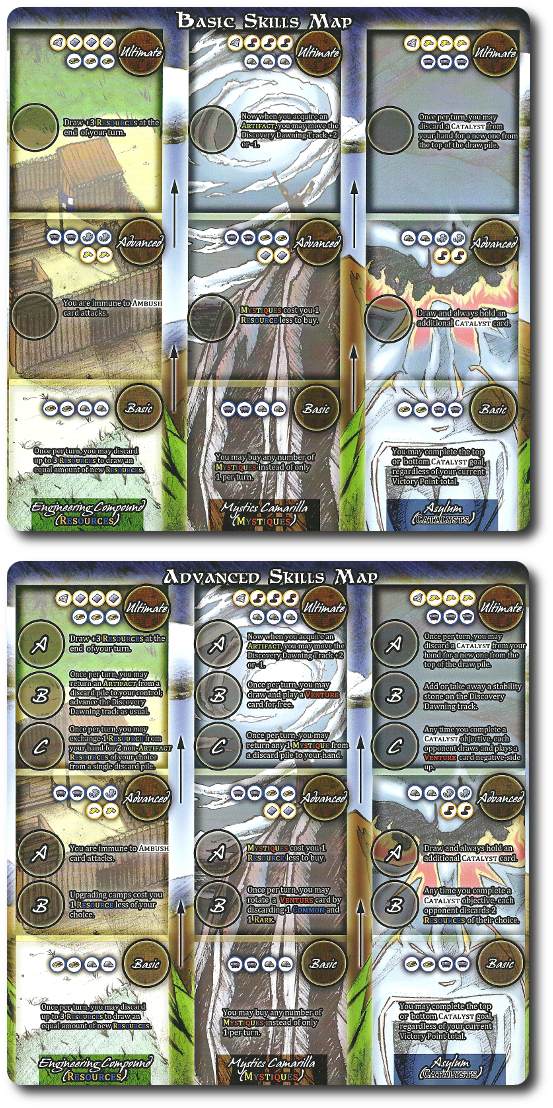
The Discovery Dawning track acts as clock that indicates how much of the game is left and what universal actions impact all the players. At the start of the game, 1 chip per player was placed on the Stability Stones space. As the game progresses, these chips will be removed. For as long as there is at least 1 stone, the day on the island never seems to end. Once the last chip is removed, night comes to the island and the game ends.
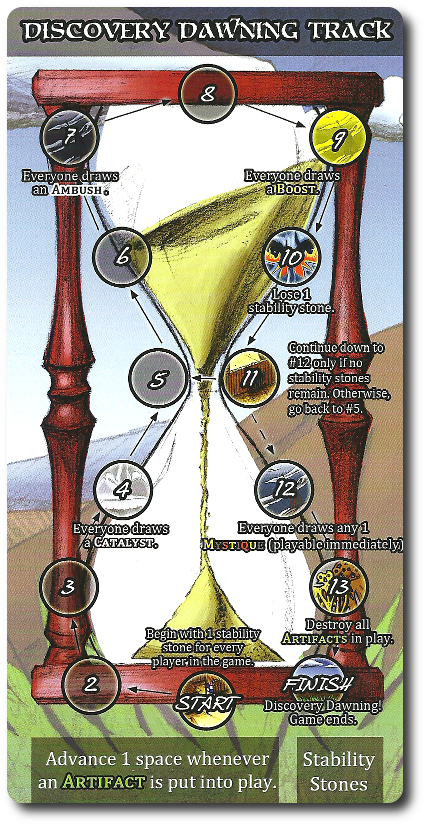
Catalysts and Brinehorn’s Scroll
Catalyst cards give a player a unique secret objective that they can attempt to complete to earn additional victory points. Pursuing the goals listed on the Catalyst card is optional. A player is not penalized for not completing the listed goal. Each card lists 2 objectives. The first is easier and is only available to the player if they have 7 or less victory points. The second is harder and is only available if the player has 8 or more victory points. Once either of the objects are completed, the Catalyst card is flipped over and a victory point is earned.
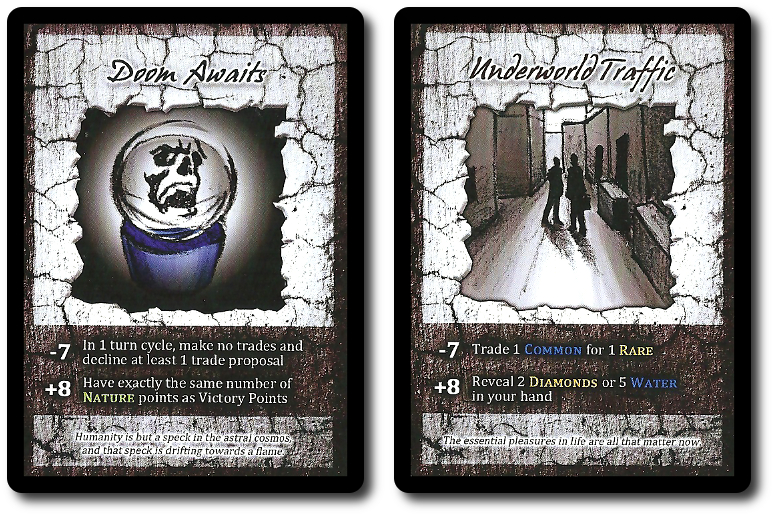
Brinehorne’s Scroll contains all the answers to all the riddles on the island. It represents knowledge and the power that comes with it. But such power is not earned without sacrifice and labor. The 3 pieces of the scroll are found in 3 different draw decks. One in the Common, one in the Rare, and one in the Venture Mystique draw deck. To find the scroll, the player must dig through these 3 decks or provide opponents rich trade deals to collect the pieces already found. Claiming the scroll is a guaranteed way to be victorious, but achieving said goal is highly unlikely if everyone knows the player is looking for it.
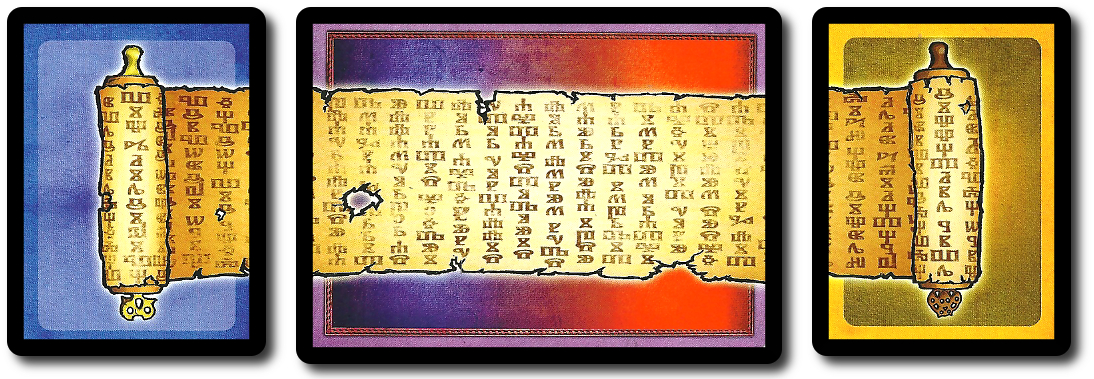
The completed scroll
Mastering the Island
There are 3 different ways to win the game. If players have completed Catalyst cards, they should reveal them now.
- The first player to earn a total of 14 victory points on their Skills Map, Catalyst cards, and Venture Mystique cards wins the game.
- The player with the highest number of nature points (provided by Mystique cards) when the plastic chip moves to the “Finish” space on the Discovery Dawning track wins the game.
- The player to collect all 3 Brinehorn’s Scroll pieces wins the game.
To learn more about The Bermuda Crisis: Discovery Dawning (2nd Edition), visit the game publisher’s website or visit the Kickstarter campaign.
Final Word
The Child Geeks were split down the middle right from the start. The game was easily learned, but what divided the group was the concept of long-term planning. The Bermuda Crisis is a game played in turns, but the overall goal is based on a strategic end. This means a player’s turn needs to be tactical, both action-specific and reactionary. Failure to approach the game without a plan and the means to subtly change it based on events, will result in players being left in the dust. According to one Child Geek who was feeling rather stressed about the game, “I don’t understand how anything works or what I should focus on. There are too many cards and too many options!” But this is exactly what the other half of the Child Geeks liked. The ability to navigate the game in seemingly endless ways to achieve goals really appealed to the more advanced players. According to one such Child Geek, “The game only keeps getting better the longer I play it!” When the votes were in, the Child Geeks gave The Bermuda Crisis a mixed endorsement.
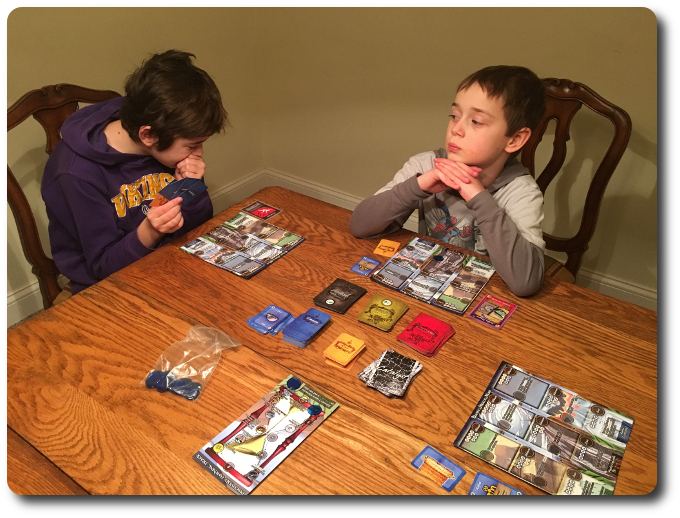
The Child Geeks learned that trade was an efficient way to get what they wanted, but not always profitable
The Parent Geeks were at first a bit overwhelmed by the game, but the gentle learning curve helped all the players get a good grasp without feeling dragged. According to one Parent Geek, “The game gently ramps up, introducing new actions as the player claims them. I feel like the game is always going at my speed.” Another Parent Geek said, “The game is more involved than I thought it would be, but it never felt like work.” The Parent Geeks didn’t think the game’s theme and narrative was used enough in the game, resulting in the players feeling like they were playing in a themeless exploration and building game. Even so, they still found the game to be entertaining and challenging, but never to a point where it was overpowering or overwhelming. The Parent Geeks voted to approve The Bermuda Crisis.
The Gamer Geeks were impressed with the game, finding the many different aspects of game play and multiple paths to victory to be both in sync and autonomous. According to one Gamer Geek, “The Bermuda Crisis gives players a lot of room to explore, experiment, and grow. It’s not a game that leads the players, but nor does it ever let them get lost. It has a good mix of player interaction that keeps the table lively and the game’s momentum going.” What the Gamer Geeks liked the most was the trading, which actually felt like a meta game, with the players constantly attempting to trade towards their goals, while at the same time limiting the benefits of those they traded with. But most importantly, the Gamer Geeks liked that luck and chance had nothing to do with the game. Random card draws were fine, but everything else in the game could be directed, controlled, and influenced. As one Gamer Geek put it, “This is a game where the player is at the wheel. It’s up to them to keep their strategy on the road to victory.” All the Gamer Geeks gave The Bermuda Crisis their approval.
With 3 different ways to win the game and lots of ways to go about it, The Bermuda Crisis kept me engaged from the very start. The game does run a bit long at times, as you search for specific cards, but the trick to move things alone is to trade. In fact, I’d suggest you make trading an absolute requirement. Failure to do so will cause players to spend more time digging through piles of cards rather than engaging with opponents and making deals. The game is much more entertaining when you are shaking hands with the enemy.
I have now played the game enough times to know that it has a great deal of replay value. I have tried all 3 routes to victory, all 3 approaches to skills, and mixed and matched them as many times as I cared to. Not once did I play the same game. Yes, the means in which I played the game was always the same, but not the methods used to attempt to achieve victory. I traded a great deal during 1 game and kept to myself in another. Both worked and both were fun. The only time I have not had fun in the game is when my youngest spilled milk all over it. Milk does not do the board game hobby good.
There’s a lot in this game, but it all comes together. Its gentle difficulty curve gives players enough time to learn as they go, adjust as they move forward, and have a good idea of what comes next. In does, in many respects, teach and then reinforce the abstract ideas of tactics and strategy. Halfway through the game a player may suddenly widen their eyes in surprise as they realize they have “a plan”. A plan they didn’t consciously consider, but they nevertheless constructed.
If you are in the mood for a game where the road to victory forks many times, where strategy and tactics will come as naturally to you as blinking, and choices are given in a way that excite you to make decisions, then do play The Bermuda Crisis: Discovery Dawning (2nd Edition). What you might discovery is beyond me, but I doubt you’ll be disappointed in what you find.
This is a paid for review of the game’s final prototype. Although our time and focus was financially compensated, our words are our own. We’d need at least 10 million dollars before we started saying what other people wanted. Such is the statuesque and legendary integrity of Father Geek which cannot be bought except by those who own their own private islands and small countries.



